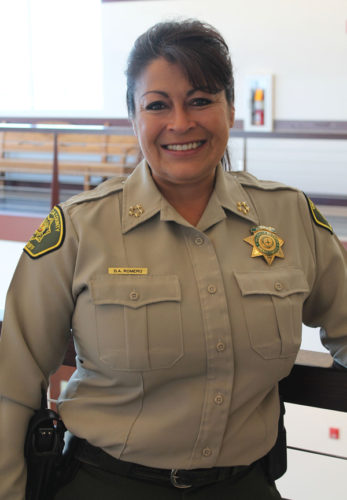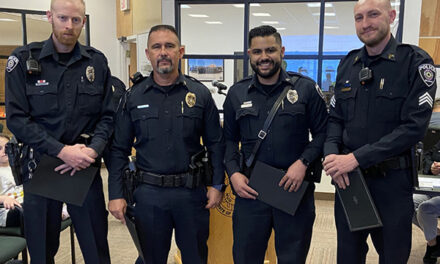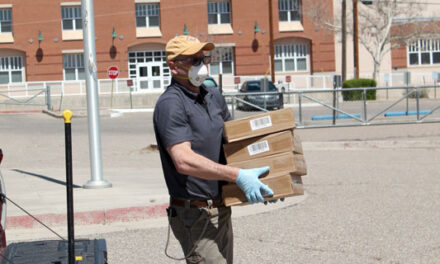Valencia County commissioners approved a body camera contract last week to put the sheriff’s office in compliance with legislation passed earlier this year.

Sheriff Denise Vigil
During a special legislative session in June, House Bill 8 was passed, mandating all police officers in the state wear body cameras while interacting with the public.
Gov. Michelle Lujan Grisham signed the bill on July 8, giving agencies 90 days to come into compliance with the new law.
The Valencia County Sheriff’s Office was one of two local departments that did not have cameras already. The village of Bosque Farms doesn’t use body cameras.
Valencia County Sheriff Denise Vigil said the department ultimately went with a system from California-based Visual Labs, which relies on cell phones as the hardware, due to cost and needing to meet the state’s deadline.
The county commissioners approved a one-year contract with Visual Labs for $59,600 to provide the software and cloud storage for the cameras VCSO will use.
When the Legislature mandated the body cameras, it didn’t include funding for departments to buy hardware and software.
Vigil said while the phones would be able to make calls, there would be no other applications installed except for the Visual Labs recording app.
“These are county-owned cell phones and their only purpose is for recording the video,” Vigil said.
While sergeants, lieutenants and detectives with the department are already assigned county cell phones, the sheriff said deputies typically aren’t. The phones used by the department are iPhones, which won’t support the app, so the new devices will have an Android operating system.
Vigil said deputies will log into the app when they begin their shift and as per the operating procedures, she and her staff are developing, they won’t be allowed to log out until the end of shift.
“There’s no reason to log in and out during a shift,” she said. “They will have to manually start the recording, which is a difference between this system and the one we were looking at.”
In a previous interview, the sheriff said the department was looking at a system that would automatically begin recording if a deputy was running or drew their weapon. That system came with a price tag of nearly $500,000.
“There are other applications that can be added to get those functions,” she said. “We’re having to piece meal this together a little bit.”
The videos have to be stored for 120 days, as per the new state law, and Vigil said the department was buying its own storage to locally store videos taken during investigations that may take time to prosecute, such as homicides, sexual assaults and other violent crimes.
If a deputy is out of range of a cell signal while recording, the file will automatically upload once they are back in range, the sheriff said.
The phones will be purchased from Verizon on a state contract, county purchasing officer Rustin Porter said at the Aug. 19 commission meeting.
VCSO Chief Deputy Jeff Noah told commissioners the recordings are not kept on the phone.
“They are automatically uploaded to (a cloud storage),” Noah said. “Deputies don’t have access to the recordings to edit or delete them. Even I don’t have access.”
Noah said after doing research, the department felt it would need an evidence technician to handle public records requests for the videos and do any redactions needed before videos were publicly released.
“We found that redaction time was about three hours per hour of footage. During the demo of this system, we had 2 minutes and 20 seconds of video. We redacted three people and some audio and it took about five minutes,” Noah said. “We had three deputies on scene, so that’s six or seven minutes. That’s why we’re asking for the extra body.”
Noah said in July, the sheriff’s office received 2,099 calls for service and on average, deputies spent 27.5 minutes at a scene, which would translate to about 1,535 hours of footage a month.
“That’s a lot of hours. Right now, we do not have a camera system and we routinely get (records) requests for things we don’t have, so we feel once we get the cameras, requests will increase,” Noah said.
Visual Labs will store footage 180 days, 60 days longer than the state law requires, but after that, only 20 percent of the data would be retained, Noah said.
“That’s why we’re buying local storage, so we can keep footage from investigations of very serious crimes locally,” he said.
The commissioners voted 4-0 to approve the contract and the new evidence technician for the sheriff’s office. Commissioner Charles Eaton was not at the meeting.
Julia M. Dendinger began working at the VCNB in 2006. She covers Valencia County government, Belen Consolidated Schools and the village of Bosque Farms. She is a member of the Society of Professional Journalists Rio Grande chapter’s board of directors.

















